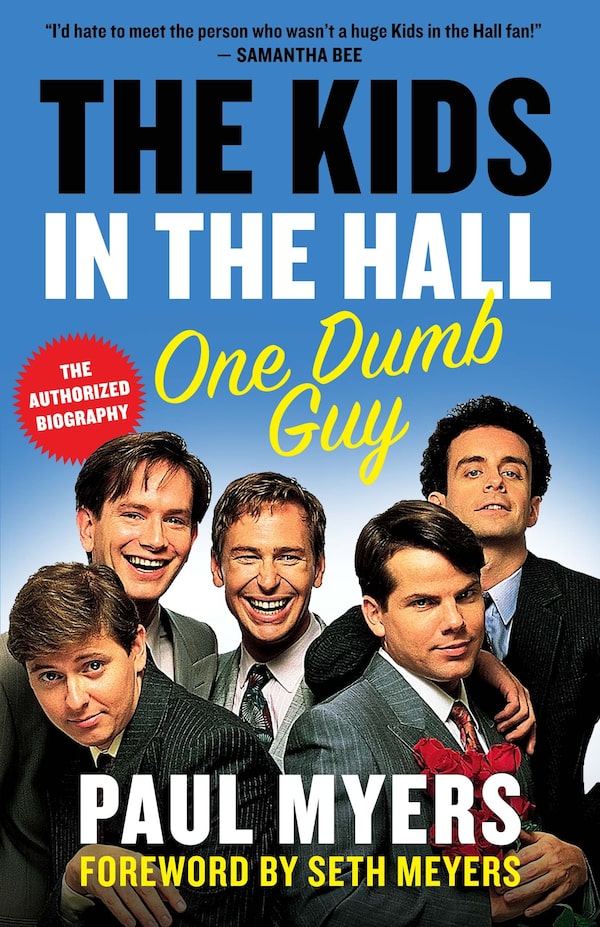
The Kids in the Hall: One Dumb Guy
By Paul Myers
House of Anansi Press, 352 pages
Do we really need another Kids in the Hall biography?
Since 2014, troupe member Bruce McCulloch’s memoirs, Let’s Start A Riot, John Semley’s This Is a Book About the Kids in the Hall and now Paul Myers’s The Kids in the Hall: One Dumb Guy makes three books in four years.
For the YouTube generation who now watch the Kids’ sketches online instead of Gen-Xers trapped on their sofas in the late 1980s at the mercy of scheduled television, these literary backgrounders on the Kids might be fresh material.
Myers’s The Kids in the Hall: One Dumb Guy reveals the rock-star-esque story of Canada’s stage and small-screen comedy sensations.
Scott Thompson goes toe-to-toe with political correctness … again
The Kids in the Hall (KITH) sketch comedy troupe formed in Toronto in 1984, staged a multiyear live show then a five-season co-production run with Broadway Video’s Lorne Michaels on CBC Television, HBO and CBS Late Night (1989-1995).
In one of the show's skits, Dave Foley plays a bride to Scott Thompson's groom.The Canadian Press
McCulloch and Mark McKinney began their comedy careers at Theatresports Calgary, then as members of the Audience troupe that moved to Toronto in 1983. David Foley and Kevin McDonald were in the original Kids in the Hall group. Scott Thompson, the openly gay York University dramatic arts student, eventually persuaded four straight guys to let him join.
The Kids produced a movie (Brain Candy, 1996) and an eight-part miniseries (Death Comes To Town, 2010). The five-man troupe staged the latest of many North America reunion tours in 2015 and they’re busy with projects outside of the Kids.
Myers has crafted a solid, well-written KITH biography that documents the dysfunctional families that shaped them, their emerging careers in comedy, their eventual success and the American comedians they influenced.
Myers’s KITH biography is similar to Toronto pop culture and media critic John Semley’s This Is a Book About the Kids in the Hall.
But Myers’s authorized biography reads more as a long-time friend’s insider account than Semley’s journalistic approach.
Scientists Simon (Mark McKinney, left), Baxter (Scott Thompson, centre) and Alice (Bruce McCulloch) feel out of place at a swank cocktail party in the Paramount Pictures and Lakeshore Entertainment comedy Kids in the Hall: Brain Candy.George Kraychyk
Myers is Mike (Austin Powers) Myers’s elder brother. In the mid to late 1980s, the Myers brothers witnessed the Kids’ sketch comedy genius unfold in the backroom performance space of Toronto’s Rivoli restaurant.
“The troupe had been honing their act for months, and I had been laughing along with their uniquely suburban take on social justice, big-city life, and institutional hypocrisy,” recalls Myers who now lives in Berkeley, Calif.
“Week after week, I witnessed them creating fresh material out of the ether, developing new characters, and forging a unique comedy aesthetic.”
Myers states that while clearly informed by Monty Python’s Flying Circus, SCTV and Saturday Night Live, the Kids’ highly disruptive comedy was as anarchic as any punk rock show playing in the neighbouring bars of the Queen Street strip.
“Sure, they were all white males, but in the early ‘80s, just having one of those white males be openly gay – and not always playing it for laughs – seemed downright revolutionary. While the Kids played all the female roles themselves, it never seemed like a campy act, and their ‘ladies’ were frequently the heroes of their scenes.”
The five suburbanites wrote and performed timeless, character-driven sketches: freaks (Chicken Lady); the insane (the Sizzler Sisters); the name-dropping gay socialite (Buddy Cole); obnoxious businessmen (the two Geralds) and authority figures (Police Department) – sometimes served up with a delicious dollop of absurd misanthropy, such as McKinney’s Mr. Tyzik. “I’m crushing your head! I’m crushing your head!”
In 2000, they released Kids in the Hall: Same Guys, New Dresses, a behind the scenes look at their 1999-2000 reunion tour.
As with most of us who “got” the Kids’ humour, I wasn’t looking for a chuckle every week when I heard that unmistakable bass intro and Gretsch guitar lick from Shadowy Men on a Shadowy Planet’s Having an Average Weekend.
I needed a belly laugh that only truthful, dark comedy brings and the Kids deftly left out the gentle humour since gentle humorists are the caddies on comedy’s golf course.
One missed opportunity in The Kids in the Hall: One Dumb Guy is that neither Myers nor the Kids address the current state of comedy, which is under threat from rampant censorship – the progenitor of mediocrity. In 2015, stand-up comic Jerry Seinfeld stated that he, Chris Rock and Larry the Cable Guy no longer tour the U.S. college circuit because of student hostility toward their material.
Die-hard fans can never read enough biographies on The Kids in the Hall, so Myers’s new biography deserves some space on your comedy bookshelf. There’s no need to crush his head.
D. Grant Black is a Saskatchewan writer, editor and teleplay writer currently shopping around a dark serial comedy. He has watched every episode of Monty Python’s Flying Circus, SCTV and The Kids in the Hall too many times to count.